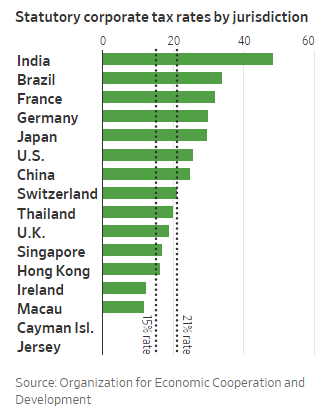If it comes to pass, U.S. plans for global minimum levy on corporate profits could rattle companies with lots of overseas revenue and very low tax bills.
The U.S. Treasury Department wants a global minimum corporate tax rate of 15%,a reduced askfrom the 21% level it previously suggested. If the policy ever came to pass, that could still have a marked impact on international markets.
On a headline basis, the 15% tax would move several countries not typically considered tax havens—Thailand, the U.K. and Vietnam, for example—onto the safe side of the line.
In both Hong Kong and Singapore, headline corporate tax rates sit between 15% and 21%. But in reality, as noted by Asia economists at Citi, their effective tax rates are made considerably lower by various breaks and incentives and a 15% level would likely still cause issues. Ireland and Macau, with corporate tax rates at 12.5% and 12% respectively, would both be caught even without considering any breaks or incentives.

Paradoxically, the lower the minimum proposed, the greater the threat to the most obvious havens such as Jersey, the Cayman Islands and the British Virgin Islands. Since those territories have 0% corporation tax rates, they will be hit under an agreement on any level and a lower proposal is more likely to garnerbroad international support.
Relatively less-taxed sectors of the equity market haveoutperformed considerablysince the global financial crisis, something which hasn’t been unnoticed by policy makers. Even if we leave the idea of a global minimum tax aside, the Biden administration plans to double the tax on global intangible low-tax income repatriated from abroad,known as Gilti.
One interesting possibility raised by credit analysts at Danske Bank is that a global minimum tax—and higher rates in general—could increase corporate debt levels at the margin by exacerbating the bias toward debt financing that is already embedded in most tax systems.
While it is still unclear whether a global minimum tax will ever come to pass, the worm seems to have turned on corporate tax levels generally. Companies that pay very low corporate taxes—and their investors—should brace for impact.
精彩评论